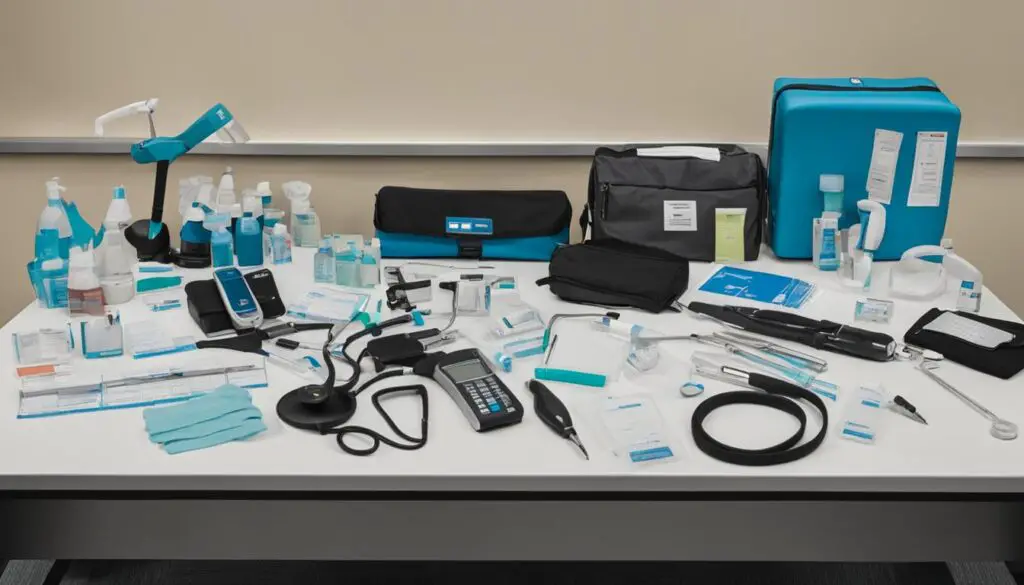
Embarking on a nursing career can be both challenging and rewarding. For newly minted RNs, taking the first step into the healthcare field can seem intimidating.
However, starting out as a graduate nurse offers an array of promising opportunities and pathways for career growth. In this article, we will delve into the exciting prospects available for new graduates looking to join the healthcare industry.
From the transition from student to RN, to the different educational pathways and entry opportunities, this article provides a comprehensive overview of the graduate nurse career. With a wide range of employers and sectors to choose from, nursing professionals can expect rewarding and fulfilling job prospects.
Additionally, continuous learning and development opportunities, along with increasing earning potential, make nursing a dynamic and attractive field to launch a career in. Let’s explore the possibilities that await new graduates entering the world of nursing.
SEO relevant keywords: Graduate Nurse Career, new graduate, nursing career, healthcare entry, RN transition.
Understanding the Graduate Nurse Role
As a graduate nurse, you will have a range of duties and responsibilities specific to your job profile. Having clinical experience is critical in mastering these tasks.
The clinical experience will play an important role in your ability to succeed in the nursing profession, hone your skills and gain proficiency in tasks such as:
- Administering medication
- Documenting patients’ medical history
- Checking vital signs
- Providing wound care
- Assisting physicians with inpatient procedures
These tasks may vary depending on the work setting and can range from basic to complex procedures.
To get a better idea of the daily tasks of a graduate nurse, see the table below:
As you gain more clinical experience, your responsibilities will increase, specifically in terms of decision and task delegation.
Overall, having a clear understanding of the tasks and responsibilities as a graduate nurse will help you become successful in your role and transition smoothly into your nursing career.
Entry Opportunities for Graduate Nurses
Graduate nursing careers provide numerous entry opportunities for healthcare professionals across many regions worldwide. Countries, such as the United States and those in Europe, have been known to have a high demand for nurses, offering various opportunities for new graduates to showcase their skills and progress in their careers.
In the United States, the situation for nursing professionals is promising, with a projected growth rate of 7% between 2019-2029, according to the Bureau of Labor Statistics. In Europe, graduate nurses have access to a broad range of opportunities in various specialties, such as pediatrics and mental health.
Other regions, such as the Middle East and Asia, have been particularly favorable in hiring international nurses with attractive salary packages that come with additional perks, including subsidized housing and healthcare benefits.
| Country | Job Opportunities | Salary Range |
|---|---|---|
| USA | Registered nurse, clinical nurse, travel nurse, critical care nurse | $55,000-$115,000 per year |
| Canada | Registered nurse, charge nurse, clinical nurse, nursing educator | $60,000-$105,000 per year |
| UK | Staff nurse, care home nurse, health visitor, district nurse | £24,500-£40,000 per year |
| UAE | Registered nurse, critical care nurse, dialysis nurse, oncology nurse | AED 72,000-AED 240,000 per year |
| Australia | Registered nurse, clinical nurse, midwife, mental health nurse | $51,000-$120,000 per year |
As the table above shows, there are numerous job opportunities and salary ranges for graduate nurses in different countries. Prospective nursing professionals must consider factors like job demand, salary, and career trajectory when selecting their preferred entry point into the healthcare industry.
Training and Education for Graduate Nurses
Aspiring graduate nurses are required to complete a Bachelor’s or an Associate’s degree in nursing from an accredited institution. The coursework includes anatomy, psychology, physiology, nutrition, and pharmacology. Additionally, hands-on clinical training is an essential part of nursing education. 
Educational Pathways
There are various educational pathways available for graduate nurses, including traditional on-campus programs, online programs, and hybrid programs that combine online and on-campus courses.
Certification Programs
Specialization certification programs are an excellent way for graduate nurses to gain additional skills and knowledge. Some popular certification programs available include Pediatric Nursing, Trauma Nursing, and Gerontology Nursing. Certification programs are offered by professional organizations such as the American Nurses Credentialing Center (ANCC).
Application Process for Graduate Nurse Positions
Graduate nurses can apply for positions in hospitals, clinics, nursing homes, and other healthcare settings. The application process generally includes submitting a resume and cover letter, completing an application form, and attending an interview.
Continuing Education
Continuing education is essential for graduate nurses to stay up-to-date with the latest developments in the field. Many nursing schools offer continuing education courses, while professional organizations such as the American Nurses Association (ANA) provide online courses and webinars.

Job Outlook and Employment Sectors
Graduate nurses have a bright future ahead, with diverse job opportunities available in various sectors and industries. The healthcare industry employs the majority of nursing professionals, including hospitals, long-term care facilities, clinics, and home healthcare services.
Other sectors, such as education, research, and government organizations, also offer employment opportunities for graduate nurses. For instance, nursing educators can teach and train nursing students while working in academic settings like colleges and universities. Alternatively, nurses can pursue research positions that require data analysis skills and insight into healthcare policies.
A location-wise analysis indicates geographic variation in employment sectors. In the US, the top five employers of RNs are hospitals, ambulatory healthcare services, nursing homes, government agencies, and education facilities. In the UK, nursing professionals find employment in public sector organizations like the NHS, private hospitals, and community services. In the UAE, nursing professionals can find opportunities in public and private hospitals and clinics, while in Australia, nursing professionals work in hospitals, aged care facilities, and community healthcare services.
An analysis of employment sectors by industries reveals that the healthcare and social assistance sector is the most significant employer of nursing professionals globally. Within this sector, hospitals are the largest employers of RNs. Other major industries that require nursing services include educational services, government agencies, home healthcare services, and outpatient care services.
| Industry | Employment Percentage of RNs |
|---|---|
| Healthcare and social assistance | 61% |
| Educational services | 7% |
| Government agencies | 5% |
| Home healthcare services | 4% |
| Outpatient care services | 4% |
It is vital for nursing professionals to be aware of the diverse employment sectors and identify where they can find the best opportunities. By leveraging the strengths of each sector, nursing professionals can gain valuable experience, improve their skills, and make a meaningful impact in their communities.
Salary Expectations for Graduate Nurses
One of the most significant factors that new graduates consider before embarking on their nursing careers is salary. While it is true that nursing is a rewarding profession with many opportunities for professional growth, it is also crucial to understand the earning potential in this field.
The average salary for a registered nurse in the United States is $77,460 per year, according to the Bureau of Labor Statistics. However, there are several factors that influence a nurse’s salary, such as location, experience, and specialization. For instance, nurses working in metropolitan areas tend to earn more than those in rural areas, while those with advanced degrees and specialized certifications may command higher salaries.
An in-depth analysis of salary trends in the nursing profession reveals that nurse anesthetists, nurse practitioners, and nurse midwives are some of the highest-paid nursing professionals, earning an average salary of $115,800 per year. On the other hand, licensed practical nurses earn relatively lower salaries, with an average of $48,820 per year.
It is worth noting that salaries for nursing professionals are not static and are subject to change depending on several factors, such as shifts in the economy, changing healthcare policies, and technological advancements in the field. Therefore, it is essential for graduate nurses to remain up-to-date with industry trends and invest in their professional development to enhance their earning potential.
Salary Comparison for Nursing Professions
| Type of Nurse | Average Annual Salary |
|---|---|
| Registered Nurse | $77,460 |
| Nurse Anesthetist | $174,790 |
| Nurse Practitioner | $114,510 |
| Nurse Midwife | $105,030 |
| Licensed Practical Nurse | $48,820 |
As shown in the table, there are significant differences in salaries for various nursing professions. Graduate nurses should carefully consider their career goals and personal interests when selecting a specialization within the nursing profession.
Development Opportunities and Promotion Prospects
As graduate nurses gain experience, they can develop skills and acquire new knowledge that can lead to growth opportunities and promotion prospects within the nursing field. However, it is important for nurses to identify the required skills and competencies for career advancement.
Communication, critical thinking, leadership, and teamwork are some of the essential skills that nurses should possess to advance their careers. Furthermore, nurses can seek additional education and certification programs to attain specialized skills and knowledge, which can open up new doors for development opportunities and promotion prospects.
The nursing field offers various career paths, including advanced nursing practice, research, education, and administration. Nurses can pursue these paths and access new opportunities with different employers, such as hospitals, clinics, nursing homes, and schools.

Continuous learning and professional development are essential for nurses to stay up-to-date with new healthcare technologies, treatments, and practices. The nursing field is constantly evolving, and nurses should embrace opportunities for growth and development to advance their careers and make significant contributions to the healthcare sector.
Similar Jobs and Professions in Healthcare
Graduate nurses have an advantage of diverse roles and opportunities within the healthcare field. Beyond working as registered nurses, there exist several alternative careers paths and professions related to nursing. Professionals with nursing backgrounds can leverage their skills, clinical knowledge and experience to transition into areas such as:
| Role/Profession | Description |
|---|---|
| Medical and Health Services Manager | These professionals plan, direct and coordinate healthcare services in various settings, including hospitals, clinics or nursing homes. They oversee budgets, personnel, and work to ensure the efficient delivery of medical services and patient care. |
| Medical Assistant | Assist physicians and other healthcare professionals in performing administrative and clinical tasks. Some of their duties may include taking patient histories, recording vital signs, preparing patients for exams, and administering medications as directed by physicians. |
| Health Educator | These professionals develop and implement health education programs that promote healthier lifestyles. They work to increase awareness of health concerns, develop materials for educational campaigns, and may provide education and training to members of the public or other healthcare professionals. |
| Healthcare Consultant | These professionals work with healthcare organizations to offer advice on various aspects of healthcare management. They may provide guidance on issues related to organizational structure, financial management, or clinical operations. |
| Nurse Practitioner (NP) | These are nursing professionals with advanced degrees and specialized training who work independently or collaboratively with physicians. NPs can diagnose, treat, and prescribe medications, and may choose to specialize in areas such as pediatrics, adult or geriatric care. |
These careers offer a range of opportunities for professionals with nursing backgrounds. They provide a chance to specialize, progress into more administrative or managerial roles, or serve the community in educating and promoting healthier lifestyles.
Global Trends and Future Outlook for Graduate Nurses
As the healthcare industry continues to evolve, nurses are facing increasingly complex roles and responsibilities. This has led to numerous global trends in the nursing profession that are expected to impact the future outlook for graduate nurses.
Advancements in healthcare technology have already begun to transform the way nurses provide care. From electronic health records to telemedicine, these technological advances are expected to streamline care delivery and enhance patient outcomes. In addition, emerging healthcare needs, such as aging populations and chronic disease management, are creating new demand for nursing professionals.
The evolving role of nurses is also expected to shape the future outlook for graduate nurses. With the shift towards patient-centered care and interprofessional collaboration, nurses are becoming more instrumental in care coordination and decision-making. This presents both opportunities and challenges for graduate nurses, as they navigate these complex care environments.
Overall, the future outlook for graduate nurses looks promising, with strong demand for nursing professionals and opportunities for advancement and career growth. However, it is important for nurses to remain adaptable and continuously learn and develop their skills to meet the evolving needs of the healthcare industry.
Conclusion
In conclusion, a graduate nurse career is an excellent launchpad for nursing professionals looking to make their mark in the healthcare entry. This article has explored promising opportunities and pathways available for new graduates, highlighted the importance of clinical experience and specific tasks that graduate nurses typically handle, and discussed the various entry opportunities in the U.S., Europe, and other regions.
Additionally, we have covered the training and education requirements for graduate nurses, the diverse employment sectors and industries available, as well as salary expectations and promotion prospects. We have also highlighted similar jobs and professions available for nursing professionals in healthcare and analyzed global trends in the nursing profession, exploring the future outlook for graduate nurses in light of emerging healthcare needs and advancements in healthcare technology.
Overall, a career as a graduate nurse offers a world of possibilities, continuous learning, and immense satisfaction that comes with contributing to the well-being of others. As nurses play an increasingly critical role in the healthcare system, it is more important than ever to consider this career path as a viable option for those interested in healthcare entry.
Questions and Answers
What is the role of a graduate nurse?
A graduate nurse is a newly graduated nursing professional who has completed their nursing education and is transitioning into the role of a registered nurse. They typically work under the guidance and supervision of experienced nurses, gaining clinical experience and further developing their skills.
What are the responsibilities and tasks of a graduate nurse?
Graduate nurses are responsible for providing direct patient care, monitoring patient vital signs, administering medications, assisting with medical procedures, documenting patient information, and collaborating with the healthcare team to ensure optimal patient outcomes. They may also educate patients and their families on healthcare practices and provide emotional support.
What are the entry opportunities for graduate nurses?
Graduate nurses have numerous entry opportunities in both their home countries and abroad. Countries such as the United States, Canada, Australia, and the United Kingdom are in high demand for nursing professionals and offer attractive entry programs for graduates. Additionally, there are opportunities in Europe and other regions for graduate nurses to gain valuable experience and launch their careers.
What are the training and education requirements for graduate nurses?
To become a graduate nurse, individuals must complete a nursing education program and obtain a nursing degree. This typically includes theoretical coursework and clinical rotations to develop the necessary skills and knowledge. Additionally, graduate nurses may need to pass a licensure exam and meet any specific requirements set by their country or state.
Which sectors and industries employ graduate nurses?
Graduate nurses can find employment in a wide range of sectors and industries within the healthcare field. They may work in hospitals, clinics, nursing homes, rehabilitation centers, home healthcare agencies, schools, research facilities, and government organizations. The demand for nurses is high across various healthcare settings.
What salary can graduate nurses expect?
Salary expectations for graduate nurses can vary depending on factors such as location, experience, and specialization. Entry-level positions may have lower salaries compared to more experienced nurses. However, the nursing profession generally offers competitive wages, and as graduate nurses gain experience and further their education, their earning potential increases.
What are the development opportunities and promotion prospects for graduate nurses?
Graduate nurses have ample opportunities for professional development and career advancement. They can pursue advanced certification courses, specialize in a specific area of nursing, or further their education with a higher degree. Promotion prospects include moving up the nursing hierarchy, taking on leadership roles, and becoming nurse practitioners or nurse educators.
Are there similar jobs and professions for individuals with a nursing background?
Yes, individuals with a nursing background can explore various career paths within the healthcare industry. Some similar jobs and professions include nurse educator, nurse researcher, nurse consultant, healthcare administrator, clinical nurse specialist, nurse practitioner, and nurse anesthetist. These roles allow individuals to utilize their nursing knowledge and skills in different capacities.
What are the global trends and future outlook for graduate nurses?
The nursing profession is evolving in response to global healthcare trends. With the advancement of technology, the integration of telehealth, and the emphasis on preventive care, graduate nurses will play a crucial role in delivering quality patient care. The future outlook for graduate nurses is promising, with increasing demand for healthcare professionals and opportunities for specialized roles.

